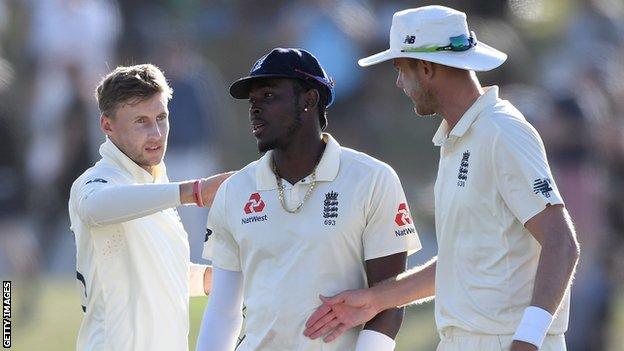England in New Zealand: 'Hosts show Joe Root's side how to play Test cricket in impressive win'
- Published

This is the third time New Zealand have beaten England by an innings in Tests
New Zealand have just shown England precisely how to play Test cricket.
It is no coincidence that four years ago in the World Cup it was also New Zealand who showed England how to play one-day cricket.
By beating the tourists by an innings and 65 runs in the first Test at Mount Maunganui, they have done it again, this time in the longest format.
The Black Caps lost the toss on a flat pitch and lost the first day as England closed on 241-4.
But the hosts kept fighting, kept their discipline, kept their patience and won the match.
It is the exemplary way to play Test cricket and England have been taught an object lesson.
Regardless of how outstanding New Zealand were and how much England have to learn, it is still very disappointing that Joe Root's side could not bat out just under four sessions on a pitch the opposition scored over 600 on.
People will watch the highlights of England's second innings and scratch their hands at the some of the shots played.
Late on day four, Dom Sibley pushed at a wide ball, Rory Burns played a sweep at a bad time and Jack Leach walked off without reviewing, given out caught to a ball he hadn't nicked.
On day five, Root played a very indecisive stroke and prodded a tame catch to gully, Jos Buttler played no stroke to a ball that hit the base of off-stump and Ollie Pope could barely reach a wide, slow full toss from Neil Wagner but hit it to cover.
Mistakes can happen when a batsman is in a defensive frame of mind and so England did have to keep the scoreboard ticking along, but they still had to do everything at minimum risk in order to save the game.
Chasing low full tosses outside off is not smart.
The likes of Pope and Sibley are young and will learn from this experience though.

England toiled in the field for 201 overs as New Zealand hit 615-9 declared
Root's captaincy was good at times in this Test but some of the bowling plans were bewildering.
England talk about a patient, disciplined batting approach but that should also be the case for the bowling.
Why on earth was Plan A on day three bowling bouncers on a slow pitch with three men on the boundary? I don't understand that.
Plan A should be trying to hit the top of off-stump or just outside.
Instead, when number eight Mitchell Santner came in, England did not have a slip in - that was really strange and he went on to make his maiden Test century.
Even before Santner arrived, New Zealand were 224-5 after lunch, still trailing by 109 runs as England took the new ball.
It was a key moment in the game and one that should have seen Jofra Archer called upon, but instead Sam Curran was given the responsibility.
England wanted to see if the ball would swing for Curran because that makes him more effective but that also then lessens Archer's effectiveness.
Archer is a special bowler and not just a bouncer bowler - he's much better than that.
He bowls an aggressive pace on a good line and length and should be getting people caught in the slips, not bowling bouncers hoping someone is going to flog it to deep square leg.
In contrast, if you look at the fields New Zealand set on day five, they were unorthodox but were set to encourage the bowling of a full length.
They had three men in an arc catching close in on the off side to the quick bowlers. It meant that if a batsman got it slightly wrong on a two-paced pitch they were going to get caught. It was a really well thought out field for the conditions.

Joe Root now averages 39.70 in 34 Tests as England captain
Root made just 13 runs in his two innings, the lowest total he has scored as England captain in a Test, and as soon as a batting captain starts to struggle people start to talk about his position.
The worry is he gets so concerned about his batting average that his captaincy suffers or vice-versa.
It can be a vicious circle, though Root told the Test Match Special podcast that he does not believe the captaincy is affecting his batting.
He is not batting well at the moment and he trying a different trigger movement but got out to two poor shots in this game.
He is, however, a fine player and just has to find some form because when he does he'll make the opposition pay.
You just have to hope that it doesn't begin to weigh too heavily on him.
